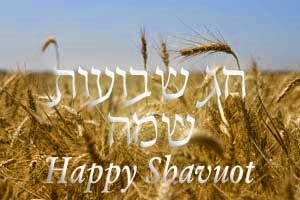Shavuot began on May 23 and ends on May 25.
In Judaism it is known as the "Feast of Weeks" and in Christianity it is called “Pentecost.” In The Torah Shavuot
is mentioned in connection with Passover and with bringing offerings from the
harvest. “You shall count off seven
weeks [from Passover]…then you shall observe the Feast of Weeks, offering your
freewill contribution according to how Adonai your God has blessed you.” (Deut.
16:10). During the Temple Period, two additions were made to the observance of Shavuot.
First, the priests would make a special
offering of two loaves of bread on behalf of the nation. Bread was an unusual offering, since it is
made by human hands. In general,
offerings were animals or grain, raw materials coming directly from the earth
to God. This offering of bread,
representing a human-Divine partnership in giving food to the world, would soon
become important in the rabbis’ radical re-interpretation of Shavuot. The
second special feature of Shavuot during the Temple period was the bringing of
first fruits of the harvest, fruits of any of the seven species, to the Temple.
Each family travelled to Jerusalem,
carrying their first fruits, to make a special offering at the Temple. Read the
complete article at -- http://www.heschel.org/page.cfm?p=445
Not only did Yeshua read and speak Hebrew, so did his followers and disciples! Two very well known, but not accurately understood words in the Gospel of Matthew prove it – jot and tittle . For some reason jot and tittle stick in the minds of Christian Bible readers. But when you ask them what jot or tittle mean, you get a lot of conflicting and some really weird answers. Today, you are going to get the facts about what Yeshua originally said and how they ended up in English translations of the Bible as jot and tittle . Let’s begin by reading Matthew 5:18 from the King James translation: For verily I say unto you, Till heaven and earth pass, one jot or one tittle shall in no wise pass from the law, till all be fulfilled. If you have not read the article “ From Yeshua to Jesus ” in Yeshua’s Kingdom Handbook please take a moment to read it online by clicking here before you continue. In it you will see how we began with the name “ Jesus ” and traced it through Lati...

Comments
Post a Comment